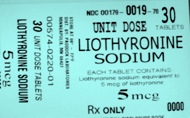10 THYROID TIDBITS that just may enlighten you!
 Thyroid tidbit #1 COCONUT OIL: Thyroid patients continue to report that the daily use of Coconut Oil (extra virgin is good) caused an increase in metabolism and even weight loss in  somewho wanted the latter. How much daily? It varies from 2-4 T. but be careful, as too much can cause diarrhea.
Thyroid tidbit #1 COCONUT OIL: Thyroid patients continue to report that the daily use of Coconut Oil (extra virgin is good) caused an increase in metabolism and even weight loss in  somewho wanted the latter. How much daily? It varies from 2-4 T. but be careful, as too much can cause diarrhea.
Thyroid tidbit #2 GRASS FED DESICCATED THYROID: Are you worried what the pigs were eating before the thyroids became desiccated?? If so, try Dr. Lowe’s Thyro-Gold, which is actually from cow who are pasture-fed. Then report back to STTM on the Contact Me page and tell us how it works for you as a treatment, or not work. I will compile information and report it here.
Thyroid tidbit #3 ALZHEIMERS DISEASE: Improving your thyroid function just may lessen your chance of getting dementia. But research has also found a Leptin connection: http://www.webmd.com/alzheimers/news/20091215/more-leptin-may-mean-less-alzheimers
Thyroid tidbit #4: ASHWAGANDHA: If you have sluggish adrenals and are on cortisol, adding the herb Ashwagandha can be an excellent and natural additional support for your adrenals. Even without adrenal fatigue, it’s also good in the face of excess emotional stress, and is an anti-inflammatory.
Thyroid tidbit #5 REVERSE T3–IS YOURS TOO HIGH? The body naturally converts T4 to RT3 as a way to clear out excess T4. But you can also make too much when your ferritin is too low, your adrenals are stressed, B12 is low, in the presence of diabetes, and other chronic issues. High levels of RT3 can cause a pounding heartrate, continued hypo, and just a feeling that you aren’t feeling great yet. To learn more, go here.
Thyroid tidbit #6 BI-POLAR: Have you been diagnosed with bi-polar disease? If so, you might want to do the right tests for hypothyroidism, since there can be a strong connection between the two, and you can either be undiagnosed thanks to the wrong test, or undertreated thanks to Synthroid, Levoxyl, Eltroxin or other T4-only medications. Read more here plus more detail in the STTM book.
Thyroid tidbit #7 GREEN POWDER: Don’t like green veggies but want to be healthy? Look into the different varieties of “Green Powder” that you can stir into your favorite juice or water. Read the labels, tho, and avoid those with soy. Note: if you use too much, you are also consuming oxalates. So moderation is key.
Thyroid tidbit #8 YOUR GRANDMA: Thyroid function will naturally go downward in the elderly.That’s why grandma starts wearing that purple sweater in weather you are sweating in.  But putting those over 65 on T4-only thyroxine is not the answer, as a recent study showed.  That’s why YOU AND I are lucky to be on desiccated thyroid with its direct T3, or even those of you who are on T3 only.
Thyroid tidbit #9 EGGS ARE A BIT SCARY RIGHT NOW: Not necessarily for thyroid folks only, but you should be aware that with the recent recall of huge amounts of eggs in the US, there are reports of a four-fold increase in Salmonella Enteritidis infections since May 2010 because of eggs and health officials fear the worst may be yet to come. Why? Because the same eggs have been used in other products. Scroll down this page to see list of recalled eggs. P.S. if you get salmonella and are on cortisol for adrenal fatigue, you should discuss with your doctor about using OTC cortisol cream, since you may not be able to hold down the pills. 1/4 tsp equals 10 mg cortisol.
Thyroid tidbit #10 FLU SHOTS vs. VITAMIN D: Just when you are making progress treating your hypothyroidism and/or adrenal fatigue comes the season for the flu. And if you google the same same title of this tidbit, you’ll see numerous articles about the efficacy of taking Vit. D rather than the flu shots. Â How much? General recommendation are 1000 IU’s daily at the minimum. Others point to more. Do your research.




